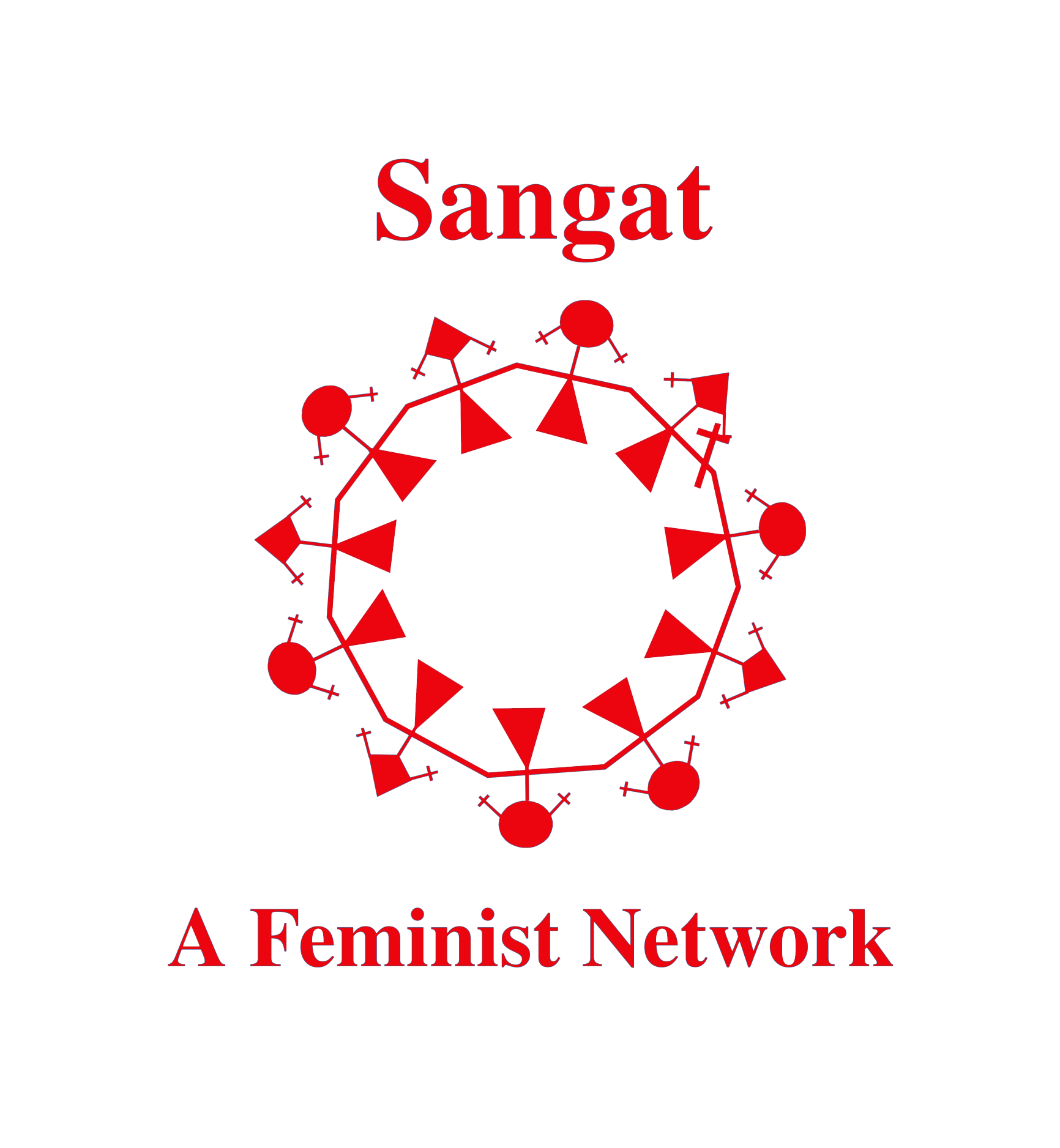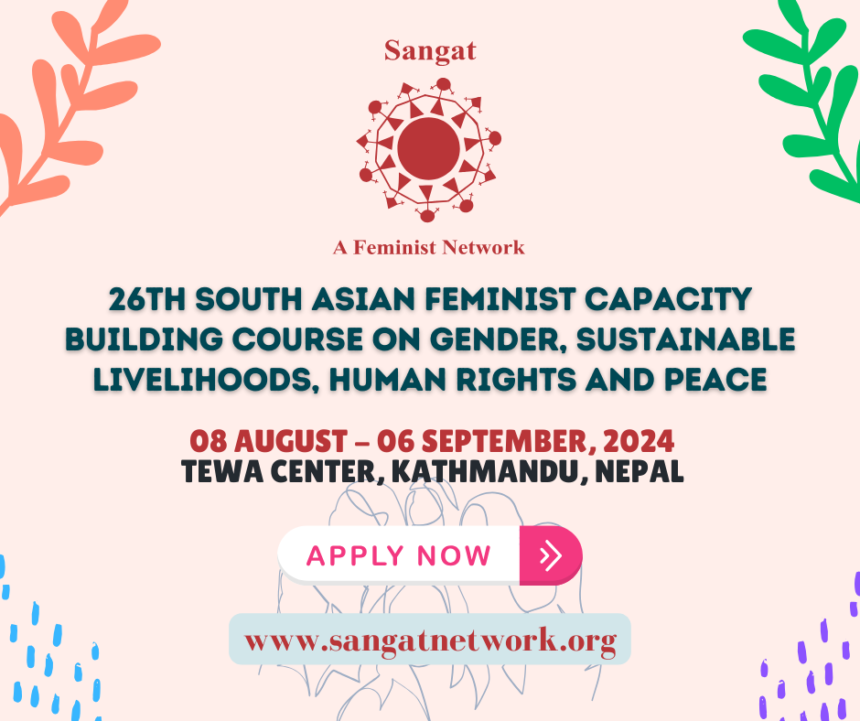08 August – 06 September 2024, Tewa Center, Kathmandu, Nepal
BACKGROUND
The South Asian Feminist Capacity Building Course on Gender, Sustainable Livelihoods, Human Rights and Peace, also known as the Sangat Month Long Course, is designed to offer clarity on and a greater understanding of concepts related to gender, justice, poverty, sustainable development, peace, democracy, and human rights. The course was founded in 1984. Thus far, 25 editions have been held through which 810 women activists and gender trainers, women’s studies teachers, journalists, lawyers, police officers, media women, and others have improved their conceptual capacities and sharpened/developed feminist perspectives. Many of these women are now in senior positions in various organizations and institutions, are active in social movements and several are conducting similar gender workshops and women’s studies courses in their own countries.
These courses seek to unpack and understand the lived experiences of people navigating the world as women, and to build solidarity between them.
The courses have been designed for women from South Asia (Afghanistan, Bangladesh, Bhutan, India, Nepal, Maldives, Pakistan, and Sri Lanka). In some years participants from Indonesia, Ghana, Sudan, Turkey, Myanmar, Vietnam, Palestine, and Iran have also attended, leading to effective networking amongst participants.
OBJECTIVES
The main objectives of the course are:
- To create a wide pool of committed feminist activists who are facilitators of change, with a strong foundation in theoretical perspectives on gender equality and social justice, and can apply intersectional feminist perspectives and gender-sensitive pedagogies to their personal lives, work, and activism in their countries and the South Asian region.
- To offer participants an opportunity to increase their understanding of and sensitivity to a range of issues related to gender, justice, poverty, sustainable development, peace, democracy, and human rights in the South Asian region.
- To share information about and build feminist perspectives on ongoing processes of neoliberalism, globalization, militarization, identity politics, conflict, and peacebuilding, and their manifestations and impact in South Asia.
- To facilitate intensive dialogue and experience sharing amongst women development practitioners and activists, human rights defenders, women’s/gender studies teachers, media women, lawyers, etc. in South Asia.
- To help participants increase their self-awareness and self-confidence, and enhance their analytical, communication, and training capacities.
- To build lasting friendships and forge feminist solidarities across South Asian borders and strengthen networking and cooperation for advocacy, action, and organizing campaigns on gender justice, poverty, sustainable development, peace, democracy, and human rights in South Asia and elsewhere.
PARTICIPANTS
Course participants have included activists, non-governmental organization professionals, researchers, teachers from various disciplines including, women’s/gender studies, artists, government officials, journalists, lawyers, trade unions representatives, among others.
Applicants to the Sangat Month Long Course are required to have:
- A background in and commitment to working on issues related to gender, justice, poverty, sustainable development, peace, democracy, and/or human rights.
- A minimum of three years of work experience.
- A good working knowledge of spoken and written English.
The course will accept a maximum of 25 participants. This course is open to women, in all their diversities, including transpersons and those belonging to minority and marginalised groups.
DATES, DURATION VENUE AND LANGUAGE
The dates of the course are 8 August to 6 September 2024.
The course will be held at Tewa Centre at Dhapakhel, Lalitpur, on the outskirts of Kathmandu, Nepal. This is an intense residential course, and all participants (including Nepalese) are required to reside at Tewa Centre (wheelchair accessible) for the full duration of the month-long course.
The working language of the course is English. Therefore, proficiency in written and spoken English is necessary.
CONTENT
The course covers several thematic areas relevant to the South Asian context. The topics incorporate the needs and interests of the participants and may vary every year.
The thematic areas cover a wide range of topics, including:
- Gender inequalities, and its intersection with other axes of difference such as caste/class/ religion.
- Patriarchy, toxic masculinities, multiple strands of feminisms.
- Neo-liberal paradigm of development, globalisation, militarisation and its impact on poverty and gender equality.
- Climate change and the need for building sustainable livelihoods and alternative development models.
- Peace, democracy, and human rights.
- Tensions and conflict between and within countries in the region, democracy and authoritarianism, and the role of identity politics and nationalisms in creating divisions.
Specific issues related to the LBTQI+ community, women workers, minority groups, indigenous people are discussed with representatives from these groups.
Transformative strategies and social movements are presented and discussed in relation to the specific context of South Asia covering:
- Struggles dealing with women’s rights as human rights (CEDAW and other UN Conventions).
- Women’s reproductive and sexual rights and health, mental and emotional health and politics of the body.
- Dismantling patriarchy, caste, and other forms of discrimination.
- Violence against women.
- Eco-feminist climate justice.
- Conflict transformation and peacebuilding.
- Self-awareness and self-growth.
- Digital activism, accountable governance, and right to information.
RESOURCE PERSONS
Resource persons are well-known knowledgeable feminist activists/scholars who are a part of South Asian women’s movements and are committed to supporting processes of women’s empowerment and solidarity. In prior years, the following individuals have served as resource persons:
Bangladesh: Farida Akhtar, Khushi Kabir, Sultana Kamal, Sara Hossain, Rizwana Hassan, Amena Mohsin, Lubna Marium, Muktasree Chakma, Naila Kabeer.
India: Late Kamla Bhasin, Abha Bhaiya, Martin Macwan, V. Rukmini Rao, Manisha Gupte, Nandita Shah, Nandita Gandhi, Deepa Dhanraj, Amrita Chhachhi, Lata Mani, Anjali Bharadwaj, Shankar Singh, Amrita Johri, Dipta Bhog, Nivedita Menon, Anuradha Kapoor, Shabnam Virmani, Uma Chakravarti, Roshmi Goswami, Ratnaboli Ray.
Nepal: Mina Acharya, Durga Ghimire, Sapana Pradhan-Malla, Saloni Singh, Mira Mishra, Renu Rajbhandari, Hisila Yami, Indira Shrestha, Rita Thapa, Mona Sherpa, Sambida Rajbhandari, Tika Dahal, Susan Risal.
Pakistan: Late Rubina Saigol, Ambreen Ahmad, Nighat Said Khan, Maria Rashid, Azra Talat Sayeed, Asha Bedar
Sri Lanka: Kumari Jayawardena, late Sunila Abeysekera, Hasanah Cegu, Zainab Ibrahim, Niluka Gunawardena.
METHODOLOGY
The course methodology is participatory and experiential, and guided by feminist principles of teaching and learning.
The course provides opportunities for participants to acquire and develop training skills through ‘learning by doing’. Participants are actively involved in suggesting issues for discussion, making presentations and documenting the sessions. Attempts are made to minimize the formal divisions between ‘organizers’ and ‘participants’, the trainers and trainees. The emphasis is on group discussions and case presentations.
Relevant reading material will be identified and provided to participants. Participants are required to do the readings and engage in the discussions.
In order to make the process lively and effective, songs, dance, music, plays, posters and films are used throughout the course.
Visits to local NGOs and women’s organizations are built into the course.
Participants are encouraged to participate in public events.
COSTS
Participants or their organizations are expected to pay for their travel to the course and 1600/- USD to cover the costs of food and lodging. Please note that Sangat does not charge a fee for the course itself. However, Visa fees and medical insurance will have to be borne by participants.
Some fellowships to cover the costs of airfare, food, and lodging are available for applicants from South Asia who are unable to raise funds to participate in the course. Please note that fellowships are limited and highly competitive. Applicants are strongly encouraged to raise their own funding, where possible.
If you would like to apply for a fellowship, please provide justification for these two questions on the Google application form:
1) why you need a fellowship; and
2) why sponsoring you is important.
Please note that fellowships are not available for those from outside the South Asia region.
APPLY HERE : 26th Month Long Course-Google Form
The deadline for submission of applications is 31 May, 2024.
Note:
Please ensure that you have a passport that is valid for at least one year before you apply for this course.
All selected candidates are requested to purchase health insurance from their own countries prior to their arrival, as well as pay for any medical costs incurred in Nepal. All participants are also requested to pay for their own visa fees and any local travel (from and to the airport within their countries). Sangat will not bear these costs.
For any inquiries please contact:
- Durga Sapkota, Coordinator, Sangat Nepal: durga.sangat@tewa.org.np
- Bipasha Saed, Associate Coordinator, Sangat Regional Secretariat: bipasha.sangat@nijerakori.org
To download the application process, click here


Leave a Reply